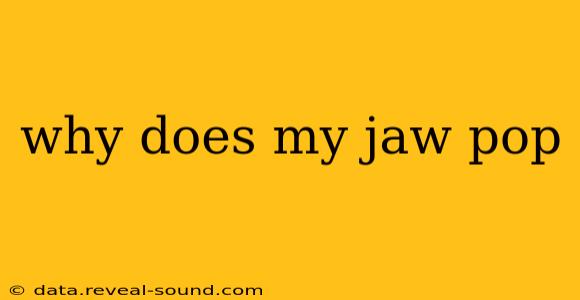Experiencing a popping jaw can be unsettling, but it's a surprisingly common issue. This phenomenon is often associated with Temporomandibular Joint (TMJ) disorders, affecting the joints connecting your jaw to your skull. Understanding the underlying causes can help you address the problem and find relief.
What Causes a Popping Jaw?
The popping sound you hear is usually the result of the disc in your TMJ shifting out of place. This disc acts as a cushion between the bones of your jaw joint. When it's properly positioned, your jaw moves smoothly. However, various factors can disrupt this alignment, leading to that characteristic popping sound:
-
Disc displacement: This is the most frequent cause. The disc can slip forward, backward, or even become completely displaced, causing the popping sound as it moves back into place during jaw movement.
-
Ligament laxity: The ligaments supporting the TMJ can become stretched or weakened, contributing to instability and the popping sensation. This laxity often stems from repetitive jaw movements or trauma.
-
Arthritis: Degenerative changes in the joint, like osteoarthritis, can cause inflammation and irregularities in the joint surfaces, leading to popping, clicking, and pain.
-
Jaw injury: A direct blow to the jaw or a fracture can disrupt the joint's mechanics and lead to popping.
-
Grinding or clenching teeth (bruxism): This habit puts excessive strain on the TMJ, leading to joint damage and popping.
-
Stress: Increased stress levels can exacerbate TMJ disorders, leading to jaw clenching and popping.
What are the Symptoms Associated with a Popping Jaw?
A popping jaw isn't always accompanied by pain. However, some individuals experience additional symptoms, including:
- Jaw pain: Pain can range from mild discomfort to severe, throbbing pain.
- Limited jaw movement: Difficulty opening or closing your mouth fully.
- Headaches: TMJ disorders can frequently trigger headaches, often located in the temples or around the eyes.
- Earaches: Pain in the ear can be another associated symptom.
- Facial pain: Pain in the face, especially around the jawline.
- Clicking: In addition to popping, you might hear a clicking sound when opening or closing your mouth.
How is a Popping Jaw Diagnosed?
Diagnosis typically begins with a thorough examination by a doctor or dentist specializing in TMJ disorders. They will assess your jaw movement, palpate the joint for tenderness, and review your medical history. Imaging techniques like X-rays, CT scans, or MRIs may be used to get a more detailed picture of the joint.
What are the Treatment Options for a Popping Jaw?
Treatment for a popping jaw depends on the severity of symptoms and underlying cause. Options range from conservative approaches to more invasive procedures:
-
Conservative treatments: These often include pain relievers, muscle relaxants, heat or cold therapy, and lifestyle adjustments (e.g., stress management techniques, avoiding jaw clenching).
-
Physical therapy: Exercises can help strengthen the jaw muscles and improve joint mobility.
-
Splints or mouthguards: These devices can help to realign the jaw and protect the joint.
-
Surgery: In severe cases where conservative treatments are unsuccessful, surgery might be considered to repair or replace damaged components of the TMJ.
Can a Popping Jaw Be Prevented?
While not all cases of TMJ disorders are preventable, you can reduce your risk by:
- Managing stress: Employ relaxation techniques such as yoga, meditation, or deep breathing exercises.
- Maintaining good posture: Proper posture can reduce strain on the jaw.
- Avoiding excessive jaw movements: Limit activities that put excessive strain on the jaw, such as chewing gum excessively or opening your mouth wide for extended periods.
- Treating bruxism: If you grind or clench your teeth, seek treatment to manage this habit.
Does a Popping Jaw Always Indicate a Serious Problem?
Not necessarily. Many individuals experience a popping jaw without significant pain or functional limitations. However, if the popping is accompanied by pain, limited jaw movement, or other concerning symptoms, it's crucial to seek professional evaluation to rule out more serious issues. Ignoring TMJ problems can lead to chronic pain and disability.
When Should I See a Doctor?
It's best to consult a doctor or dentist if:
- The popping is accompanied by pain.
- Your jaw movement is limited.
- You experience frequent headaches or earaches.
- The popping is getting worse over time.
Remember, early diagnosis and treatment can significantly improve outcomes and prevent more serious complications. Early intervention can help prevent chronic pain and long-term problems associated with TMJ disorders.
